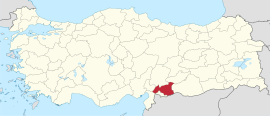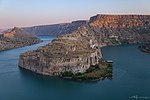Gaziantep Province (Turkish: Gaziantep ili) is a province and metropolitan municipality in south-central Turkey. It is located in the westernmost part of Turkey's Southeastern Anatolia Region and partially in the Mediterranean Region. Its area is 6,803 km2,[3] and its population is 2,154,051 (2022).[2] Its capital is the city of Gaziantep. It neighbours Adıyaman to the northeast, Şanlıurfa to the east, Syria and Kilis to the south, Hatay to the southwest, Osmaniye to the west and Kahramanmaraş to the northwest.
Gaziantep Province
Gaziantep ili | |
|---|---|
Clockwise from top: The city of Gaziantep, a barley field near the Syrian border, Amanos Mountains, Dülükbaba Park, Rumkale | |
 Location of the province within Turkey | |
| Country | Turkey |
| Seat | Gaziantep |
| Government | |
| • Mayor | Fatma Şahin (AKP) |
| • Vali | Kemal Çeber[1] |
Area | 6,803 km2 (2,627 sq mi) |
| Population (2022)[2] | 2,154,051 |
| • Density | 320/km2 (820/sq mi) |
| Time zone | UTC+3 (TRT) |
| Area code | 0342 |
| Website | www www |
An important trading center since ancient times, the province is also one of Turkey's major manufacturing zones, and its agriculture is dominated by the cultivation of pistachio nuts.
In ancient times, first under the power of Yamhad, then the Hittites and later the Assyrians controlled the region. It saw much fighting during the Crusades, and Saladin won a key battle there in 1183. After World War I and the Ottoman Empire's disintegration, it was invaded by the forces of the French Third Republic during the Turkish War of Independence. It was returned to Turkish control after the Treaty of Lausanne was signed, formally ending hostilities between Turkey and the Allies of World War I.
Originally known as Antep, the title gazi (meaning veteran in Turkish) was added to the province's and the provincial capital's name in 1921, due to its population's actions during the Turkish War of Independence.
Kilis Province was part of Gaziantep Province until it separated in 1994. Turks are the majority in the province.[4]
Geography
editGaziantep is traversed by the northeasterly line of equal latitude and longitude.
Geology
editTwo major active geological faults meet in western Gaziantep near the border with adjoining Osmaniye Province: the Dead Sea Transform and the East Anatolian Fault. These represent the tectonic boundary between the northward-moving Arabian Plate to the east, and the converging African and Eurasian Plates to the west.
On February 6, 2023, at 04:17 TRT (01:17 UTC), a Mw 7.8 earthquake occurred in Gaziantep Province on the East Anatolian Fault, which caused widespread damage and loss of life. The epicenter was 37 km (23 mi) west-northwest of the city of Gaziantep. At 13:24, it was followed by a Mw 7.7 earthquake.[6]
Demographics
edit| Year | Pop. | ±% p.a. |
|---|---|---|
| 1927 | 213,499 | — |
| 1935 | 283,506 | +3.61% |
| 1940 | 306,906 | +1.60% |
| 1950 | 328,343 | +0.68% |
| 1960 | 434,579 | +2.84% |
| 1970 | 606,540 | +3.39% |
| 1980 | 808,697 | +2.92% |
| 1990 | 1,140,594 | +3.50% |
| 2000 | 1,285,249 | +1.20% |
| 2010 | 1,700,763 | +2.84% |
| 2020 | 2,101,157 | +2.14% |
| 2022 | 2,154,051 | +1.25% |
| Source:Turkstat[7][8][9] | ||
Districts
editThere are nine districts as listed below:
The city of Gaziantep encompasses Şahinbey and Şehitkamil districts; İslahiye and Nurdağı districts form the western part of the province, while the remaining districts lie to the east of Gaziantep city.
See also
editReferences
edit- ^ "Gaziantep Valisi Kemal ÇEBER". Gaziantep Valiliği. Retrieved 24 October 2023.
- ^ a b "Address-based population registration system (ADNKS) results dated 31 December 2022, Favorite Reports" (XLS). TÜİK. Retrieved 19 September 2023.
- ^ "İl ve İlçe Yüz ölçümleri". General Directorate of Mapping. Retrieved 19 September 2023.
- ^ Khanam, R. (2005). Encyclopaedic Ethnography of Middle-East and Central Asia. Vol. A–I, V. 1. Global Vision Publishing House. p. 470. ISBN 9788182200623.
- ^ "Present and future Köppen-Geiger climate classification maps at 1-km resolution". Nature Scientific Data. DOI:10.1038/sdata.2018.214.
- ^ National Earthquake Information Center (6 February 2023). "M 7.8 - 26 km ENE of Nurdağı, Turkey". United States Geological Survey. Archived from the original on 6 February 2023. Retrieved 6 February 2023. This article incorporates text from this source, which is in the public domain.
- ^ Genel Nüfus Sayımları
- ^ Turkstat
- ^ "The Results of Address Based Population Registration System, 2020". Turkish Statistical Institute. Archived from the original on 2021-10-28. Retrieved 7 December 2021.
External links
edit- (in English) Gaziantep weather forecast information
- (in Turkish) Gaziantep local newspaper
- (in Turkish) All about cultural activities in Gaziantep




